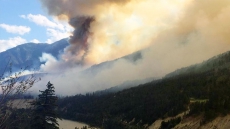HALIFAX — Scientists are preparing to deploy an arsenal of high-tech gadgetry into the Atlantic Ocean to try to track down one of nature's biggest, but most elusive creatures in a whale hunt of a different kind.
A team of researchers plan to use autonomous gliders, air support and acoustic devices to listen and watch for endangered North Atlantic right whales to determine their migratory routes along the east coast.
Kimberley Davies, an oceanographer at Dalhousie University in Halifax, said the whales have not been showing up in their usual habitats in great numbers and are likely going to areas not well known to scientists.
Davies said similar work last summer in the Roseway Basin, a known right whale habitat, left scientists shaking their heads when they recorded 93 sightings in August and then found they had all left just two weeks later.
"The fact that there were so many whales and they just deserted the whole area was shocking," she said.
"So it deepens the mystery because we don't know where they went."
Canadian and American scientists will slip the sleek yellow underwater vehicles into waters off Nova Scotia on July 27 and begin a roughly two-month long process of collecting data on the marine ecosystem and its inhabitants.
The North Atlantic right whales are known to travel into the Bay of Fundy in the summer to feed with their calves. Most make the long trek from their breeding grounds off Georgia and Florida, ending up in the bay's plankton-rich waters around June. They are also known to gather in the Roseway Basin off Nova Scotia's south coast.
Moira Brown, a senior scientist with the New England Aquarium, said they are seeing fewer and fewer of the animals in the bay and they are arriving in Canadian waters earlier than usual.
Identifying their habitats is important because the slow-moving mammals are vulnerable to ship strikes and entanglements with fishing gear, she said, adding that they can alert ships or rerouting shipping lanes once they know where the whales are going.
"Right whales are doing all kinds of strange things," she said in an interview.
"If we find other critical habitat areas, then we'll start looking at the human activities in them and see what we need to do to keep giving these whales a little more of an edge."
The team will use up to seven gliders, which are equipped with acoustic devices and high-frequency echo sounders that can instantly identify what type of mammal they're hearing. The material they collect will be sent back to the crew in almost real time.
"These autonomous gliders are like having a secret weapon in your back pocket," said Brown.
"It looks like the whales may be shifting around and this is the first year of a really huge multi-institutional effort to try to figure out where they're going."
The project comes as the North Atlantic right whale population inches up slowly, rising to about 520 from a mere 300 in the late 1990s. Their population has grown by about two per cent a year, with an average of 22 calves being born since 2001 - but only 11 born last year.
In 2003, the shipping lanes were altered in the Bay of Fundy to steer vessels clear of known whale habitats due to work done by the whale researchers. Five years later, Transport Canada made the Roseway Basin an area to be avoided by ships of a certain size.





